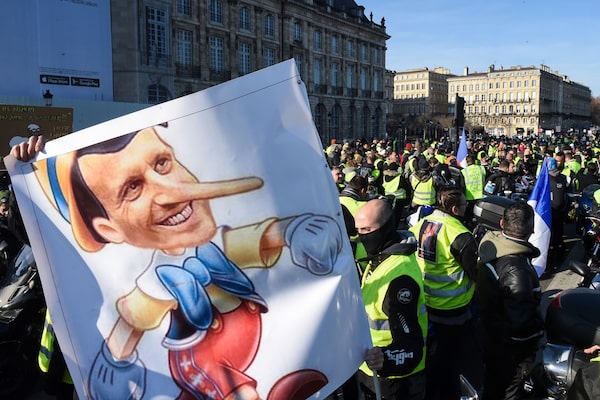Roland Lescure's seat in the National Assembly is one of 11 representing French citizens living abroad.Christinne Muschi/The Globe and Mail
When Roland Lescure resigned as chief investment officer at the Caisse de dépôt et placement du Québec in April, 2017, he ran for a seat in the French parliament and joined French President Emmanuel Macron’s movement to reform the country’s economy.
Mr. Lescure won his seat easily and now, nearly two years later, he’s had to learn the intricacies of the French government and the realities of French politics. More than two months of gilets jaunes – or yellow vest – protests against Mr. Macron’s reforms have paralyzed several cities and led to violent clashes with police across the country. The President has made some concessions, introducing wage hikes for poorer workers and tax cuts for pensioners, but his popularity has plummeted along with support for his party: La République En Marche! On Monday, the country begins a three-month national consultation dubbed the “grand debate” that Mr. Macron and Mr. Lescure hope will address some of the key complaints.
“It’s been incredibly interesting and quite a lot of fun and obviously quite a lot of pressure as well,” Mr. Lescure, 52, said from Montreal last week where he was visiting family. He’s been at the forefront of some of Mr. Macron’s biggest reforms, serving as head of a parliamentary committee that’s trying to make it easier to start a business. And he makes no apologies for the government’s decision to introduce tough measures to change labour laws, pensions, taxation and the size of the civil service. “Every time a president has come into power they announce reforms and, after a year, they have to walk back, turnaround and do something else because people didn’t want this to affect them,” he said. “This is the first time that we are actually doing what we said we were going to do.”
He acknowledged that the protests raised legitimate concerns at first, particularly regarding what many have seen as Mr. Macron’s arrogance. “The style has been criticized, and I think to a certain extent understandably, as being too directive and not listening enough,” he said. But Mr. Lescure added that lately the demonstrations have morphed into a violent mob that "has to be addressed in a very different way, which is security, law and order and repression when need be.”

Yellow vest protestors hold a banner of the French president dressed as Pinocchio as they take part in an anti-government demonstration in Bordeaux, on Jan. 5, 2019.MEHDI FEDOUACH/AFP/Getty Images
The hope now is that the national consultation, which involves meetings and discussions in 5,000 communities, will address some of the protesters' concerns and produce alternatives. Mr. Lescure said the debate is focusing on major issues such as changing political institutions, altering the tax system and looking at changes to immigration. The government is considering holding a referendum in the spring on some of the recommendations. The consultation “is basically, hopefully, going to be a gigantic collective psychoanalysis and a bit more, in the sense that we need to organize the protest so that people can actually talk more formally and address the contradiction of the French population – which is too much tax, not enough public service,” he said. “We have to address that contradiction.“ The meetings will also consider “the frustration that French people have with their politicians and elected officials,” he added.
So far, the omens don’t look good. Polls show voters have little interest in the consultation. The gilets jaunes movement, which started as a protest against gas taxes, has heaped scorn on the meetings. But Mr. Lescure isn’t deterred and said Mr. Macron and the government will push ahead with the consultation and stick to its reformist agenda. “I think what’s going to change is the tone and the style, but not the substance. On the substance, we know that we have to do it and we’re going to do it,” he said.
He still has close connections to Canada and visits Montreal regularly. His seat in the National Assembly is one of 11 representing French citizens living abroad; his riding is Canada and the United States. His wife and two sons also still live in Montreal, and he holds Canadian and French citizenship.
One of the biggest adjustments has been switching from the defined roles of the corporate world, where reporting lines and measurements are clear, to the chaos of politics. “In the governmental machine, it’s much more complex. It’s harder to imagine, to understand, how you can actually have an influence,” he said. It took about six months to figure things out and he has no regrets about his decision. “I’ve always considered this as an experience,” he said of his political career. “I’m here for five years, maybe 10 … I’ve had a good enough career before so that I’m not looking for recognition. I’m looking for impact, and so far I have had enough impact to feel good about it.”
 Paul Waldie
Paul Waldie